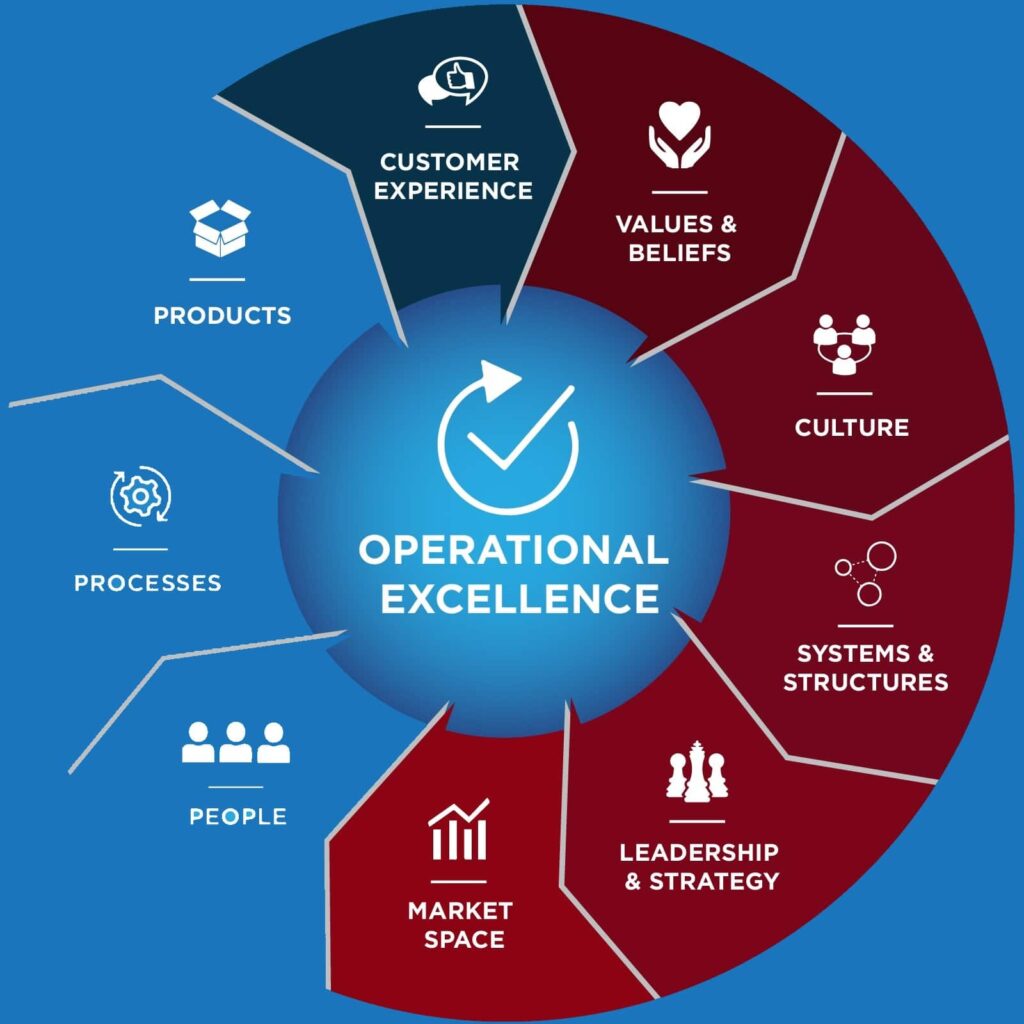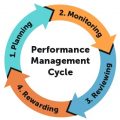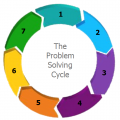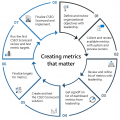
Organizations come to us for help with improving their performance increasing their production volumes, improving their quality, raising their On-Time-In- Full delivery reliability, or removing bottlenecks from their production lines.
Improving performance, and achieving a step-change in profitability, safety, customer and employee satisfaction, calls for taking an end-to-end Value Chain perspective. It calls for a single agenda, driven at speed, and boosted by true people engagement, skilled leadership, and changed behaviors. This creates a permanent shop-floor transformation, supported by digital technology which will help businesses to accelerate, faster.
customers.

The drive to keep improving to have the capacity to pursue innovation and growth (also known as execution excellence) rests on two primary pillars: the systematic management of operations and the commitment to a positive culture that focuses on customers’ needs and empowers staff. Empowered staff members have a clear understanding of goals and plans, feel secure in taking the initiative, and develop ways to fix problems. “EBL’s IOPEX’ enables an industries to do more with the same staff through better employee engagement and streamlined processes. It is not about cutting resources, but rather about figuring out together how we can better apply our resources,”
Our IOPEX assist you to see the concept as a culture that permeates everything you do rather than as an isolated initiative or event. Our IOPEX will help you manage your operations to deliver your product/service to your customer at the exact moment they desire it, at the lowest cost, with the most minor effort. At the price, the customer wants to pay.
Whatever your challenges, we will find a tailored approach with you
The EBL touch
OPERATIONS STRATEGY
Do you find your North star of Operations aligned to your business strategy?
A business’s Operations Strategy should be aligned to the business’s overall business strategy. To define your operations strategy, you should start by answering these key questions: Are we fully exploiting Operations to deliver on the business strategy, and maximize value creation? What are the key levers that impact on our targets? Do we need to design or redesign any operations? Do we need to close a gap in operational performance? How do we integrate sustainability drivers in a profitable way? How do we get the most value out of innovation and digitalization? Do we need to consolidate capabilities, or do we need new ones?
Our teams will support you answering these strategic questions to help you drive your operational strategy forward, supporting you with an implementation roadmap, and helping you to specify the relevant targets and build the business case.
OPERATIONS FOOTPRINT
Is your network of manufacturing sites, distribution locations, production lines, and machinery organized in a way that supports your operations strategy in the best way, helping to contribute to the corporate growth strategy, fulfil market and customer requirements, deliver any required cost reduction and earnings-enhancement targets?
Companies consider optimizing their operations footprint for both internal and external reasons—growth, responding to a geographical shift in markets, customers’ demand for a global presence, aggressive new players in the market, or to rationalize plants acquired through previous acquisitions. Typically, an assessment of a business’s operations footprint might precede a longer transformation project within the organization.
We help our clients manage the entire transformation process, starting from assessing the original ‘as-is’ situation, defining their target network configuration and network collaboration opportunities, identifying the business case, and building the roadmap for implementation until successful implementation including the adoption process for managing the potential impact on different stakeholder populations.
DESIGN FOR OPERATIONAL EXCELLENCE
In manufacturing businesses, incremental change is a constant. And often, a business reaches the point when incremental change will no longer deliver benchmark-class excellence. In such cases, a major change of the operating system might be needed, a different factory set-up, different organization, or a different approach to maintenance management. If that is the case, then Design for Operational Excellence is the approach that can be used to define and implement the required major changes.
Identifying upcoming challenges, assessing ‘as-is’ processes, factory layout, organization, leadership and technology—all of these impact the development of the required ‘to-be’ operating system. Evaluating the gap between the ‘as-is’ and ‘to-be’ operation systems then defines the business case, and the process of closing that gap is supported by a roadmap for implementation. Finally, to firmly anchor the results in the organization’s ‘reality on the ground’, a change-readiness check at the beginning of the transformation helps to identify key responsibilities and relevant stakeholders.
Our experts will guide you in the process from assessment and design, all the way through to sustainable implementation.
FUTURE FACTORY/SMART FACTORY
Your operational excellence has brought you expected gains in growth, cost reduction, and flexibility. Now you want to move the curve up. The time has come to explore the full potential that digital technology brings. The Future factory (also called Smart Factory) as we see it at EBL is connected, adaptable, efficient and scalable. It represents the core of Industry 4.0, can predict change, and has the ability to quickly adapt to meet customer demands. We support organizations on the development of their digital roadmap, including IT/operations technology/ET and data science in order to move from simple connectivity, via information and knowledge, all the way to prediction autonomy utilizing Artificial Intelligence (AI).
EBL start from a consideration of the company’s strategy and derived digital strategy, combined with a bottom-up assessment of digital opportunities for use cases. This provides the ‘big picture’ of available opportunities, both at a site level, and as a global operation. This picture is then translated into a full digitalization roadmap covering all business processes (quality, maintenance, logistics, productions, etc), as well as a business case that includes the resources required for implementation, the resultant cost savings, and the impacts on the main business drivers. Nor do we only look at ‘smart’ manufacturing processes and the opportunities for digitization: we also advise on the organization that is needed to support this digital transformation, and what adoption measures have to be taken to deliver the full engagement of all employees and stakeholders.
EBL has a strong capability in Industry 4.0, with experts in the different IT/operations technology topics, and also a database.
INDUSTRIAL SUSTAINABILITY
Sustainability has shifted from a “nice to have” to a core component of business strategy for many companies.
Industrial sustainability will give you access to new markets, expand your scale with the right economics, and change your ecosystem dynamics to enhance competitive advantage – to make sure you can continue to do business in a profitable way.
OPERATIONAL PERFORMANCE IMPROVEMENT
Is your business in urgent need of better operational performance, in order to match volume needs? Does it need to improve quality or service, or simply impact cost and productivity in the short term?
In which case, EBL has the approach to boost operational performance by assessing relevant workstreams, and installing clear performance management, roles and responsibilities, along with the development of leadership and performance behaviors. Supported by focused project management of structured improvement activities, clear milestones and deliverables, within three to six months the first impact on results is clearly visible. The integrated element of human dynamics then ensures that this short but intense approach is sustainable over the long run.
Boosting operational performance can be applied in different areas such as production, maintenance, quality. Often it is applied across the whole manufacturing facility, resulting in breaking down the internal silos that otherwise act as barriers to site-wide improvement.
OPERATIONAL EXCELLENCE ON SITE LEVEL
Is the operational performance not progressing anymore or only progressing by Capex? This might be a good moment to implement or renew the operational excellence approach. EBL is recognized for its years of experience in Operational Excellence and their World Class Operations Management approach, based on the industrial approaches like a.o. TPM, Lean, and Six Sigma.
Our Industrial Operational Excellence (iOPEX) approach is build from the zero-loss principle and has three levels: loss intelligence, loss eradication and loss prevention. Knowing all losses and their value helps you to make the right choice on where to attack. Knowing the relevant methods & tools adjusted in a recipe for application helps you to eradicate this loss. Knowing how to build a zero-loss prevention system in areas like maintenance, quality, flow, etc. helps you to prevent these losses from happening again. Building this Operational Excellence system is something we do step-by-step and hand-in-hand with all levels within the organization.
Our iOPEX approach, enriched with the latest digital use cases, combined with change management, leadership and performance behaviors makes it unique and very powerful. It drives your results today, and especially secures the results for your future, for tomorrow by developing capabilities of the people, processes, and systems. A truly embedded and sustainable Operational Excellence approach.
OPERATIONAL EXCELLENCE ON COMPANY LEVEL
Does your business need to create one single, standardized way of working across the business? EBL has applied its globally-standardized World Class Operations Management approach within multiple global companies in multiple industries, in each case impacting those businesses’ bottom lines. Every EBL consultant masters this approach, which means that we can work in a uniform way across the globe.
Our approach delivers a solid operational excellence strategy, combining a clear storyline (‘why’), with strong governance (‘how, who and when’) to ensure effective and efficient delivery of local projects (‘what’).
The first step is to ensure clear alignment of the program’s objectives with company strategy being the basis for a group-wide roadmap. Typically, we start our programs on selected pilot sites, followed by a roll-out across the company. All local projects have a toolkit with customized and standardized methods, and with tools available in all the relevant local languages. After a short assessment phase, resulting in clear targets, and a masterplan for how to achieve them, the local implementation will be monitored closely. A customized training academy helps speed up the transfer of capabilities from EBL to our clients, and increases the ownership of the program at all levels. In addition, the integration of change management, leadership development, and digital methods and tools drives results tomorrow, as well results today: a truly embedded and sustainable approach to Operational Excellence.
PROCESS KAIZEN ENGINEERS
Process Kaizen Engineers, the future leaders of the Operations world
To keep pace with today’s fast-moving developments in technology, there is an urgent need for organizations to focus on developing their own capabilities. This is especially important for those roles in which a strong technical background needs to be combined with highly developed leadership and managerial capabilities.
It is this specific need that led EBL Engineering Ltd to create – and continuously develop – its Process Kaizen Engineers (PKE) Development Programs.
In PKE programs, high potential engineers and young managers within an organization are provided with a deep level of training in all of the essential theoretical and technical aspects of their job. These sessions range from Problem Solving, Maintenance, Quality, Focused Improvement, Lean Flow, Sustainability, Education & Training, Safety, to Industry 4.0.
The first phase of the program is conducted in a practical way through interactive learning, simulations, group Gemba exercises, and coaching. This establishes a common base of understanding for the key second phase, which is the realization of a live project, led by the aspirant PKE within their own organization.
Fostering digital transformation
A strong emphasis is placed on fostering digital transformation. The new PKE 4.0 certification program aims to develop PKE 4.0 Kaizen Engineers within an organization, who are needed as driving force for achieving efficiency gains through digitalisation projects and use cases.
In the 4.0 certification program, traditional PKE engineers are able to extend their current competence by learning proven Industry 4.0 approaches, methods and tools. They gain practical experience through the systematic use of process data and digital technologies in order to eradicate costs and solve problems more efficiently, with the goal of increasing value creation.
They learn how to make an impact on organizational development and team motivation and how to exploit digital opportunities for performance improvement. In the process they acquire new digital skills needed to tackle future challenges.
An essential part of the PKE 4.0 certification program is the 4-day course on Data & Advanced Analytics, either on-site or virtual-based training. During this course, the attendees learn how to apply Analytics tools and platforms for collecting, visualizing, and analyzing data. They also learn how to use data for optimizing processes in production and supply chain as well as how to develop Industry 4.0 specific use cases. After having accomplished this 4-day course, attendees will get a certificate as “Industrial Data Manager”

Implementing a real improvement project
The core of any PKE program is the realization of a real project with bottom line impact for the company. This will be led by the aspirant PKE and will address a key issue for the company – typically the reduction of costs and lead times. This hands-on approach means that the learning is consolidated and that the transfer of knowledge sticks.
The project’s savings must be documented, and a final examination of the project is conducted in order to certify the qualification of the Process Kaizen Engineer.
PKE, a qualification program which is cash neutral for the organization The practical realization of projects provides real benefits and savings to the organization and will pay back the cost of the program within a year.
Leadership development
During the course of the project, the aspirant PKE leads a team of colleagues. This offers them the opportunity to develop their leadership skills, supported by on-the-job coaching from EBL’s experts.
A generation of leaders with a strong background of continuous improvement
In addition to covering the cost of the program, one of the benefits for the organization is the creation of a generation of future leaders able to apply improvement techniques throughout the entire organization.
PKEs can be seen as experts focused on continuous improvement, able to eradicate losses and break the traditional siloes among functional areas, thanks to their cross-functional mindset and ability to create a dialogue among the various functions of the organisation.
Building self-confidence and credibility of young managers
PKE programs can be considered as an exercise in accelerated job rotation, in which individuals gain experience and are tested on the job.
Future PKEs learn to communicate at all levels of the organization, from the shop floor to senior leadership. A PKE will hold a respected position inside the organization and be regarded as a reliable and competent colleague who holds a horizontal vision of processes.
An accelerated career
Becoming a PKE results in a multidisciplinary mindset, acquired by facing complex problems in different area and finding solutions connected to processes, people and technologies. The PKE qualification becomes a career accelerator due to the relationship and visibility acquired in the different levels of the organization.
Blended learning
Recently, PKE programs have also been provided in hybrid modality via blended learning. These alternate self-learning paths to create a common base of knowledge, with on-line interactive sessions in which participants, working in teams in virtual labs, solve complex problems by applying the theory learned. This is combined with live physical events, which are essential to test the depth of understanding that the engineer has acquired. This prepares the trainees for the traditional project phase, which is the key to obtaining the final PKE certification.
LEADING PERFORMANCE
Is your business driving an operational excellence program, but is not entirely satisfied with the impact, role, position, and effect of the manufacturing organization’s middle-management leadership? Have you run multiple leadership training sessions for middle management, but once they are back in their day-to-day roles, the impact is lost?
EBL has developed a proven approach called Leading Performance that develops leaders from shopfloor to the boardroom, coaching them in how to lead performance, in both the short term and long- term.
In our approach, we identify the Leadership practices best suited to a company’s values, and from these practices we align the corresponding behaviors that we would expect to see in practice. The process involves following some basic steps:
- Step 1: Defining the desired leadership (a leadership framework).
- Step 2: Selecting High Impact Moments (HIM)—for instance, a daily factory meeting, or undertaking Gemba rounds.
- Step 3: Translating the leadership framework into concrete behaviors for the selected HIM.
- Step 4: Developing specific leadership skills that will be effective in respect to the HIM.
- Step 5: Coaching and facilitating leaders in applying these leadership behaviors and sills, so as to have the desired impact on performance.
Our Leading Performance program has been proven to deliver a solid operational performance impact, in a sustainable way.
Here for you
Call us 24/7. We are there for your support
GPS Address
AK - 040-4605
Contact Details
Email Address: [email protected] +233200642591 +233202473696
Where to find us
119 Otumfo Osei Tutu II
Adjacent SSNIT Buidling
Kumasi - Ashanti Region
Ghana, West Africa



